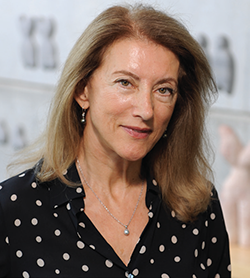
Dr. Berta Strulovici, Director of the Weizmann Institute’s Nancy and Stephen Grand Israel National Center for Personalized Medicine, explains what the center is and how it works.
The Nancy and Stephen Grand Israel National Center for Personalized Medicine is the Weizmann Institute of Science’s first comprehensive initiative to translate genetic and molecular data into information that may one day be used for more precise, more individualized patient care.
“Personalized medicine – or ‘precision medicine,’ as it has been termed by the NIH – is a form of medicine that uses information about a person’s genes, proteins, and environment to prevent, diagnose, and treat patients,” says Dr. Berta Strulovici, the new center’s director. “In the future, this knowledge will give doctors the ability to assess medical risks and monitor and treat patients according to their specific genetic makeup and molecular phenotype.”
Personalized, or “precision,” medicine uses information about a person’s genes, proteins, and environment to prevent, diagnose, and treat patients.
This approach to medicine is “proactive rather than reactive,” explains Dr. Strulovici, who received her PhD from Weizmann. Before coming back to the Institute to establish the center, she built a state-of-the-art Center of Excellence for early drug discovery for pharmaceutical giant Merck, among many other basic research/drug discovery efforts.
In order to make the dream of personalized medicine a reality, the center – named for philanthropists Nancy and Stephen Grand of San Francisco, who gave $50 million toward the center’s $120 million cost – will create “an infrastructure of interdisciplinary approaches that can systematically take discoveries and move them toward translation,” says Dr. Strulovici. And while the center is located on the Weizmann campus, it involves research institutions, hospitals, industry, and the like from across Israel. This country-wide collaboration will foster a better understanding of various disease states, which the center will share with scientists around the world.

Dr. Berta Strulovici
The center has four interdisciplinary research units, each of which focuses on an area of research critical to personalized medicine. For example, the Crown Institute for Genomics uses state-of-the-art DNA and RNA sequencing technologies to increase understanding of the genomes and transcriptomes of model organisms and humans, explains Dr. Strulovici. She plans to help meet this goal by relieving two of the most critical bottlenecks in sequencing technology: sample preparation and data analysis and interpretation.
And at the de Botton Institute for Protein Profiling, researchers are comparing healthy and diseased cells or tissues to analyze changes in protein levels and post-translational modifications important in disease processes. The study of proteins – also known as proteomics – requires extremely sophisticated technologies, says Dr. Strulovici. Thanks to the de Botton Institute’s unique setup, researchers from all over Israel will be able to use its rarely attainable instrumentation; by sharing equipment, as well as knowledge, research is exponentially advanced and everyone wins.
Next, to make sense of the large amounts of data produced during the analysis of the genome and proteome, the Ilana and Pascal Mantoux Institute for Bioinformatics is developing automated computational tools in order to reduce the time it takes to analyze such complex, large-scale data. In two years’ time, Weizmann’s bioinformaticians and programmers will be creating more user-friendly tools, so that interested research scientists will be able to analyze their own data – “with our help, naturally,” says Dr. Strulovici, with a smile.
The Weizmann Institute’s vision is that we will be able to build upon discoveries made in the genomics and proteomics disciplines and search for new therapeutic agents at the Maurice and Vivienne Wohl Institute for Drug Discovery. Dr. Strulovici explains: “When we find a protein whose aberrant activity may be causal of disease, we can design a reaction in a test tube, or an assay, that mimics the activity of the protein in cells in the body.”
This approach to medicine is “proactive rather than reactive.”
Using such an assay, the scientists can then screen against large numbers of drug-like chemicals to discover lead compounds able to modulate the aberrant activity. In the best-case scenario, such lead compounds could serve as the basis for the discovery and development of new medicines. Cutting-edge equipment makes all the difference at this point, as tens of thousand of chemicals are compared against a biological reaction. As Dr. Strulovici says, this process requires “a lot of sophisticated automation and knowledge of what to do with the data.”
Whatever the research objective, she stresses that “we need to be clever in applying cutting-edge technology.” The center must have “the appropriate robotics, detection technologies, and software, and very smart people who know how to use them.”
And, like all discoveries that come out of the Weizmann Institute, the benefits will extend beyond campus, beyond Israel, to help people all over the world. The Nancy and Stephen Grand Israel National Center for Personalized Medicine is Weizmann’s boldest effort yet in its mission of science for the benefit of humanity.
The Nancy and Stephen Grand Israel National Center for Personalized Medicine is supported by the Norman E. Alexander Family Foundation; Dr. and Dr. Rebecka and Arie Belldegrun; the Blythe Brenden-Mann Foundation Genomics Sequencing Laboratory; the Crown Family Fund for Personalized Medicine; the de Botton Institute for Protein Profiling; Peter Dubens; Ben B. and Joyce E. Eisenberg Foundation INCPM Fund; the Emquies and Romick Compound Management Laboratory; the Enoch Foundation; Mr. and Mrs. Alan Fischer; the Fondation Adelis; the Nancy and Stephen Grand Israel National Center for Personalized Medicine; the Global Philanthropic Trust; the Harmstieg Foundation; the Laurie Kayden Foundation; the Ilana and Pascal Mantoux Institute for Bioinformatics; Mr. and Mrs. Andrew R. Morse; Martin and Myrna Ossip; the Jessica and Mark Pathy Research Project; Sassoon and Marjorie Peress; the Pickman Family; the Riklis Family Foundation; the Sam & Dora Ruvkun Advanced Planning Endowment for Projects in Israel; Mr. and Mrs. Axel Schupf; the David and Fela Shapell Family Foundation INCPM Fund for Preclinical Studies; the Estate of Georgette Grosz Spertus; Leesa Steinberg; Mr. and Mrs. Menachem Sternberg; the Estate of Dr. William and Lili Weingarten; the Norman and Marilyn Weizenbaum Philanthropic Fund; the Maurice and Vivienne Wohl Institute for Drug Discovery; the Wolfson Family Charitable Trust; and the Edith & Robert Zinn Foundation.
